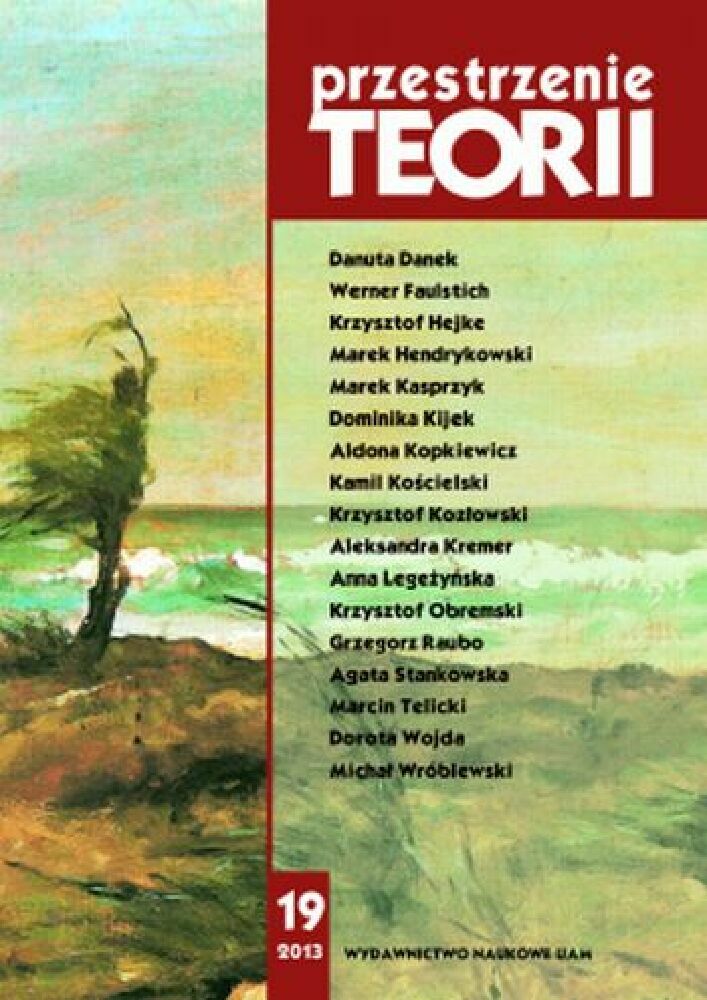Abstrakt
This article presents a confrontation of consciousness with bodiliness and physiology which can be observed in the poetry of Eugeniusz Tkaczyszyn-Dycki. Dycki points out that there is no such thing as a disembodied consciousness and makes the attempts to cross borders which are determined by language. He tries to get through to the semiotic sources of subjectivity, paying attention to the fact that a human is not able to get out of the cultural burden. The body and physiology, in this poetry, have the transgressive potential which invalidate binary oppositions. The sublimation of abject, putting emphasis on the processes of disgust/rejection as the foundation of self-image formation, allow Dycki to weaken the power of the symbolic system and episodically elude the paternalistic order.Bibliografia
E. Tkaczyszyn-Dycki, Nenia i inne wiersze, Peregrynarz, Liber mortuorum, Kamień pełen pokarmu, Przewodnik dla bezdomnych niezależnie od miejsca zamieszkania, Przyczynek do nauki o nieistnieniu, Dzieje rodzin polskich, Piosenka o zależnościach i uzależnieniach,
W: E. Tkaczyszyn-Dycki, Oddam wiersze w dobre ręce. 1988–2000, Wrocław 2010.
E. Tkaczyszyn-Dycki, Imię i znamię, Wrocław 2011.
A. Berleant, Prze-myśleć estetykę. Niepokorne eseje o estetyce i sztuce, przeł. M. Korusewicz, T. Markiewka, red. K. Wilkoszewska, Kraków 2007, s. 110.
R. Nycz, Sposoby pisania, [w:] tenże, Sylwy współczesne, Wrocław 1984, s. 46.
Z. Bauman, Ponowoczesne przygody ciała, [w:] Antropologia ciała. Zagadnienia i wybór tekstów, red. M. Szpakowska, Warszawa 2008, s. 95.
A. Świeściak, Śmiertelne sublimacje. Eugeniusz Tkaczyszyn-Dycki, [w:] taż, Melancholiaw poezji polskiej po 1989 roku, Kraków 2010, s. 153-154.
G. Agamben, Pochwała profanacji, [w:] tenże, Profanacje, przeł. M. Kwaterko, Warszawa 2006, s. 93-116.
J. Kristeva, Od brudu do skalania, [w:] taż, Potęga obrzydzenia. Esej o wstręcie,przeł. M. Falski, Kraków 2007, s. 65.
D. Kijek, Jak się staje, kim się jest. Eugeniusza Tkaczyszyna-Dyckiego poetyckie powroty w przeszłość, praca magisterska opublikowana w Bibliotece Cyfrowej Uniwersytetu
Śląskiego, napisana pod kierunkiem prof. UŚ dr hab. Danuty Opackiej-Walasek, Katowice 2012, s. 16-18 [online], <http://www.sbc.org.pl/dlibra/docmetadata?id=66920>, dostęp:
06.2013.
I. Kant, Physische Geographie, [w:] tenże, Kant’s gesammelte Schriften, Berlin 1907.
W. Menninghaus, Wstręt. Teoria i historia, przeł. G. Sowiński, Kraków 2009, s. 144.
M. Bakke, Ciało otwarte. Filozoficzne reinterpretacje kulturowych wizji cielesności, Poznań 2000, s. 109.
E. Morin, Antropologia śmierci, [w:] Antropologia śmierci, red. S. Cichowicz, J.M. Godzimirski, Warszawa 1993, s. 86.
Z. Freud, Poza zasadą przyjemności, przeł. J. Prokopiuk, Warszawa 2005, s. 78-84.
B. Umińska, Róg Szymonowica, sławnego lwowianina i Śmierci, przesławnej ziemianki, „Res Publica Nowa” 2000, nr 1-2.
S. Sontag, Choroba jako metafora, przeł. J. Anders, [w:] Osoby, red. M. Janion, S. Rosiek, Gdańsk 1984.
M. Zaleski, Formy pamięci, Warszawa 1996.
M. Witkowski, „Spartaczony z tą kreską szminki na ustach…” – Eugeniusz Tkaczyszyn-Dycki i pożądanie, „Kresy” 2004, nr 4.
Licencja
Autorzy
Autorzy tekstów przyjętych do publikacji w czasopiśmie „Przestrzeniach Teorii” są zobowiązani do wypełnienia, podpisania i odesłania na adres redakcji umowy o udzielenie nieodpłatnej licencji do utworów, z zobowiązaniem do udzielania sublicencji CC.
Zgodnie z umową, autorzy tekstów opublikowanych w czasopiśmie „Przestrzeniach Teorii” udzielają Uniwersytetowi im. Adama Mickiewicza w Poznaniu niewyłącznej i nieodpłatnej licencji oraz zezwalą na użycie sublicencji Creative Commons Attribution-NonCommercial-NoDerivatives 4.0 International (CC BY-NC-ND 4.0).
Autorzy zachowują prawa do dalszego, swobodnego rozporządzania utworem.
Autorzy, którzy wykorzystują w swoim tekście cudze utwory (np. ilustracje, fotografie) proszeni są o dostarczenie do redakcji czasopisma zgodę na publikację od uprawnionych podmiotów.
Użytkownicy
Zainteresowani użytkownicy internetu uprawnieni są do korzystania z utworów opublikowanych po 2015 roku „Przestrzeniach Teorii” tylko w calach niekomercyjnych, pod następującymi warunkami:
- uznanie autorstwa - obowiązek podania wraz z rozpowszechnionym utworem, informacji, o autorstwie, tytule, źródle (odnośniki do oryginalnego utworu, DOI) oraz samej licencji;
- bez tworzenia utworów zależnych - utwór musi być zachowany w oryginalnej postaci, nie można bez zgody twórcy rozpowszechniać np. tłumaczeń, opracowań.
Do wszystkich tekstów opublikowanych przed 2015 r. prawa autorskie są zastrzeżone.
Inne
Uniwersytet im. Adama Mickiewicza w Poznaniu zachowuje prawo do czasopisma jako całości (układ, forma graficzna, tytuł, projekt okładki, logo itp.).
